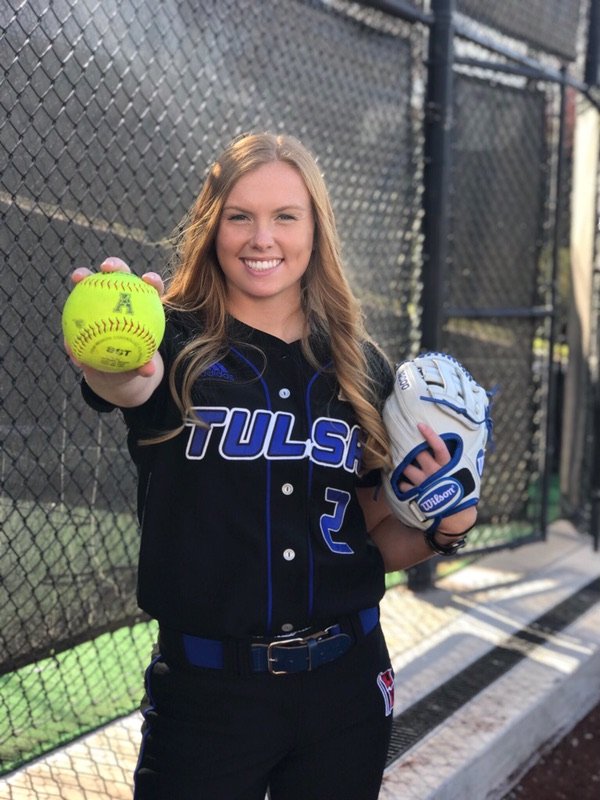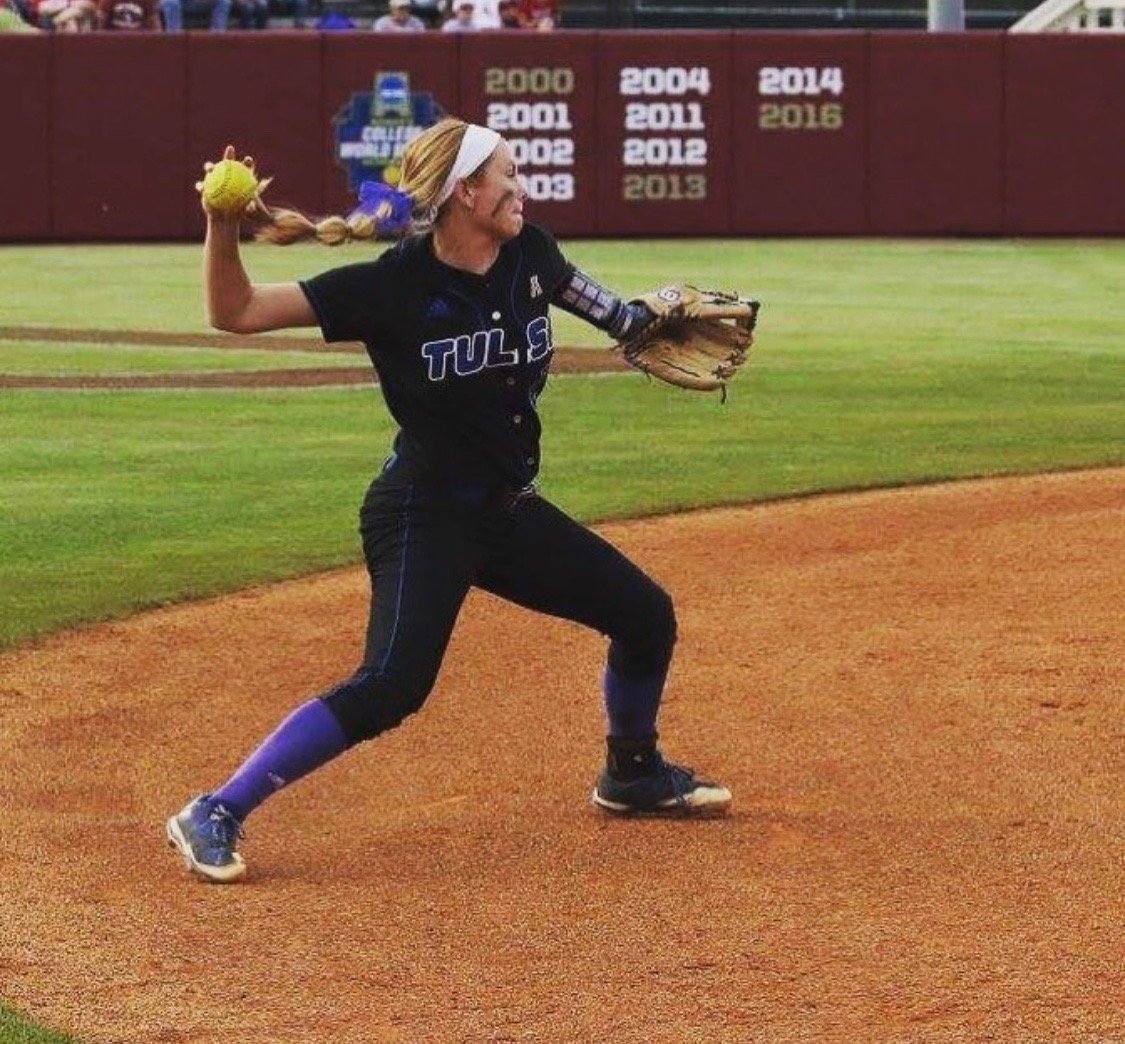Interview with softball player Shannon Hughes
Shannon Hughes went to NEO (Northeastern Oklahoma) and graduated with her Associates degree in Natural Sciences in 2016. She joined the Tulsa softball team for seasons 2017 & 2018. She graduated in 2019 with her degree in Environmental Policy. She got her master's degree in Industrial Hygiene at Central Missouri while being the Graduate Assistant coach for the Jennies softball team. Now in graduate school again, she is pursuing an MBA. She currently works full time for Evergy. She lives in Kansas City, Missouri and goes to her lake house in the Ozarks often. In her free time she loves to play with her niece and nephew. Fun fact- we got tattoos together 3 times. In this podcast we talked about her experience with being a multi-sport athlete, facing the setback of an ACL tear, being a junior college transfer to a D1, and how her life is different now without being a softball player anymore. I loved having her on the podcast and can't wait for you to hear her perspective.
Below I have written down most of what we talked about but you can listen to the full version HERE.
Q: When did you start playing sports?
A: Basketball was my first sport at around 7 or 8. I was playing on a team called the Vipers and the head coach recommended that I played softball when I was around 10.
Q: When did you start playing competitive?
A: Probably about a year or so later. I was playing competitive basketball and softball. I played competitive basketball until my junior year of high school.
Q: How did you handle the setback of an ACL tear?
A: Playing competitive softball and basketball was hard on my body since I played both from a young age. I felt like I wasn’t doing enough so I joined track. One day my junior year I came down from a high five on the softball field and tore my ACL. I tore up my meniscus and MCL and completely tore up my knee. I came back for my high school basketball season in February. Having that break from sports was a blessing in disguise to take a second to breathe. I knew I wanted to do softball so I was focusing on that. Since my injury was junior year and that’s when recruiting happens, a lot of coaches backed out of showing interest. Eric Iverson at NEO took a chance on me and we ended up doing the best NEO has ever done and I met lifelong friends there too. It led me down a path I never thought I would do but it ended up being amazing. It was a setback but I wouldn’t do it any other way.
Q: Can you talk about doing multiple sports growing up and how to prevent that injury?
A: Being a multi-sports athlete had a factor in my training and I am all about not specializing too soon. Training for those different sports will play a role in those movements in other sports. I definitely miss basketball and it was a hard day to end playing but I still have an outlet for it. Building up the muscle on the outside of my knees might have helped with prevention of injuries. Working on quick movements because those are movements you use in a lot of sports might help. Agility and quick sprints could help as well. Finding a common movement you can use in both sports could help your body. Dynamic and static stretching is important and warming up properly would be helpful.
Q: How was your Junior College experience different than Tulsa being a 4 year school?
A: We had practice every day because there is no limit like in the NCAA, and so it was the hardest 2 years of my life. We practiced outside in 2 feet of snow and practiced no matter what. We had a creek that ran behind the field that would flood so high and we would just move practice to a football field where we could practice. Once time we had a 14 inning scrimmage then practiced for 2 hours after that. It was hard and it taught me a lot about character and made me who I am. We ended up being really successful and it was a really awesome experience. It built a foundation for who I want to be and how hard I’m going to work and put everything I possibly have into something. I always praise JuCo players because I know how it is. Never doubt them because they’re tough.
Q: How did playing competitive sports shape who you are today?
A: Looking back on it now, just realizing how many friendships I made from it, you know. I just went to someone’s wedding that I met from sports. I wouldn’t have had those friendships without sports growing up. It made me tough in that injury and I had to really think about what I wanted to do and if I really loved the sport and it’s been awesome to have the friendships.
Q: How was your experience as a GA for UCM right after being done playing in college?
A: I didn’t know what I wanted to do after playing softball. It was like you’re being pushed out of the birds nest. I knew I wanted to go home and I got the opportunity to coach at UCM. It gave me a home right when I got done playing. I got to be a part of a great group and it was definitely what I needed being involved with it too and having the coaching perspective. They are really special girls. Still being involved with softball helped my transition.
Q: What was the transition out of playing competitive sports like for you? What did you do in your newfound free time?
A: It was hard transitioning from playing to coaching. I had to check myself when I wanted to go out and play while the team was playing. It was hard but it was nice to have to be involved. I had to find my new calling and I got to be there for the girls on and off the field. I got to be someone to look up to for some of them. For them seeing someone that is fresh out of playing it was nice for them to see what life is like after playing. With the new free time I get to see my niece and nephew all the time so that is nice and it’s great to be able to do things and spend time with my family. It was time I didn’t really have while playing softball. I went months without seeing my sister and my boyfriend and it’s hard but now I have time to do things I haven’t been able to do before. It’s like a new life and you’re like a new person after.
Q: Did you consider being a full time team coach?
A: I do lessons a few nights a week so I’m still heavily involved with softball. I still volunteer here and there for UCM. Full time coaching with a full time job is hard to do but doing the lessons has been good. Lessons give you the one on one time that you can help lead them to a successful path. On the other hand, I want to go to dinner with my friends or be able to attend weddings.
Q: Do you feel like you would have done a different degree if you weren’t a student-athlete?
A: I went into Mechanical Engineering because I found it interesting and I thought it was something I could do. That first semester I was getting bad grades and if you’re not familiar with the University of Tulsa, it’s very academic based. I was used to getting straight A’s in junior college and it was different being at a 4 year university. I had to change degrees because I didn’t have enough credits to be eligible to play softball. The credits that transferred from my associate’s degree didn’t transfer to the degree I changed my major to after engineering, which was Sports Management. I ended up finding a path in Environmental Policy which would make me eligible to play in the spring. It ended up being a blessing in disguise because I ended up really loving it. But if softball wasn’t in the picture, I probably would have done mechanical engineering or environmental law or maybe sports management. It did end up working out in the end but softball did make an impact on what I ended up majoring in.
Q: What was one of your favorite moments while competing?
A: My favorite moment is also a sad moment because I felt heartbreak then. Playing against OU in regionals. We were ahead and we were in the winners bracket and it was so much fun being on a roll. We were beating OU 4-2 and long story short we ended up losing but it was the most fun I’ve ever had. It was the best time ever because we were playing so well and having fun. OU ended up winning the national title that year. It was such a great experience. That whole tournament was super fun.
Q: What advice would you give to someone who is recently done playing a sport?
A: It’s such a huge life transition and it’s not gonna be easy to navigate. There’s gonna be a lot of confusion and your body will change but finding what works for you mentally and physically will be so different. Finding what makes you happy and what’s gonna give you the greatest purpose in life and find what makes you happy. Finding something that can be your outlet from sports is important.
Q: What advice would you give to someone who is currently playing a sport?
A: Don’t take it too seriously. If I had a strikeout or an error, it would dictate if I had a good or bad day. For me, I took it so seriously to the point that it would dictate if I was in a good mood or not. I think if I had more fun with it I would have enjoyed it more. Make sure you’re having fun because time goes by fast and make sure you look back and can say that you had fun rather than being so stressed out the whole time.
Q: Do you have anything else to add?
A: Once an athlete, always an athlete is a great platform for athletes to tell their story.
If you have any more questions for Shannon, please leave comments below or contact me. For more information, head to my Q & A page. If you or someone you know is struggling, please call the Suicide Hotline. It’s toll free and available 24/7 at 800-273-8255.
Once An Athlete’s mission is to provide resources and support for current and former athletes. Please support our mission by making a donation.
Are you or someone you know currently struggling with what happens in life after sports? Or did you already go through that transition to life after retiring competitive sports and wish you had more resources and support? Have you ever wondered, “what do athletes do after they are done playing sports? What’s next after sports?” Do you feel like you dedicated so much to your sport and you don’t know what to do now that you’re done competing? You’re not alone. Check out the site and join us in the journey. Once an athlete, always an athlete.
More blog posts with softball players:





